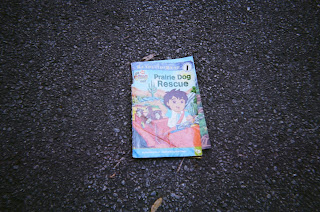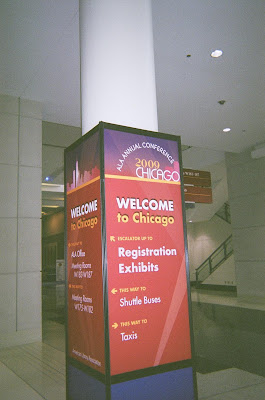
Книги! ("Books!") on the
"Bloc" and People of the Book
For many years, I've been involved with an organization that does a remarkable thing: it coordinates, underwrites, and guides groups of international professionals to visit the United States to see commensurate professions in this country. Through the generosity of your bi-weekly paychecks, the US tax code, and the friendly faces of the State Department, a multitude of multicultural coteries make their way to these fateful shores each year.

 But what was a remarkable moment of cross-cultural exchange was the moment I asked her if she spoke Hebrew (in Hebrew), and she said yes. So from then on, we abandoned our (or rather "my") fits of Slavectile Dysfunction, and murmured into the fine Semitic past with memories of Jerusalem. Here she is at left...in this not so clear photo. But you get the idea. (Below is a pamphlet the good director gave me of Jewish sites in Minsk).
But what was a remarkable moment of cross-cultural exchange was the moment I asked her if she spoke Hebrew (in Hebrew), and she said yes. So from then on, we abandoned our (or rather "my") fits of Slavectile Dysfunction, and murmured into the fine Semitic past with memories of Jerusalem. Here she is at left...in this not so clear photo. But you get the idea. (Below is a pamphlet the good director gave me of Jewish sites in Minsk).



For many years, I've been involved with an organization that does a remarkable thing: it coordinates, underwrites, and guides groups of international professionals to visit the United States to see commensurate professions in this country. Through the generosity of your bi-weekly paychecks, the US tax code, and the friendly faces of the State Department, a multitude of multicultural coteries make their way to these fateful shores each year.
The International Visitors Center of Chicago (or "IVCC") has been the main conduit of this program and it is with whom I have received continued reports of visitors for almost five years. The IVCC sends out visitor information every couple of weeks, which includes the delegation country of origin and the topic of the visit. Later on, you may discover what the profession of the delegates are. Usually, if the topic of the visit is "education," usually you have teachers or professors visiting. Similarly, if it is "librarianship," you have librarians visiting. (Before I go on, here is their website:
http://www.ivcc.org/).
I first became interested in IVCC delegates when I worked for the American Theological Library Association, when I discovered (somehow...which I've now forgotten) that a librarian from Tanzania was visiting. I arranged a meeting with him and his interpreter, and they both came to ATLA to see the magical arts of American para-corporate librarianship (I mean this in the most affectionate way, all readers of the the ATLA-cloak!) Having studied in East Africa and visited Tanzania during college, I had hoped to summon up my anemic reserves of KiSwahili, the lingua franca of the region. But the ingredients of Bantu verb classes seemed to be missing from my mental batter, and I could only throw out a puny cobbling of phrases, greetings, a misplaced future tense, an incorrect preposition, the use of a one word that I thought meant "computer interface," but actually meant "left cow's udder." (I trust you can see the similarity.) The interpreter saved us, tossing out his linguistic life preserver. He had a funny name, like Byron or Steel Wool or Wedgewood. Well, none of these are the name actually, but it was something that will come to me in about four days.
Nevertheless, that was my first experience. It was productive. We spoke about cross-cultural librarianship and such collegial ejaculations. We smiled, thanked each other, and went our happy ways.
This blossomed when I moved to my next job at the Lutheran School of Theology at Chicago (LSTC), where I became a librarian. The seminary had long been in the process of starting a center on Muslim-Christian Dialogue, through the leadership and direction of Prof. (Emeritus) Harold Vogelaar. Once the center was established--now called "Center of Christian-Muslim Engagement for Peace and Justice"--I began to connect IVCC delegates interested in inter-religious and interfaith meetings, discussions, "tête-à-tête"s, brawls, liver transplants, soul swapping, with the folks at the Center. We started with a small group of Italian-Muslims, who had come originally from places like Jordan, Syria, Iraq, Morocco, and Egypt. We served tea and bantered about the merits of the Italian political system under Berlusconi (of which plastic surgery was the answer, since the good prime minister's own eye-brow realignment had made plastic surgery no longer taboo among Sardinians and Neapolitans alike). But more accurately, the group did discuss with those of us in attendance (which was only me and Prof. Vogelaar and his wife Mai) about serious issues of concern for "people of the book." And answered questions about American society and religion. It ended amenably with a discussion of I Mille (or Thousand Red Shirts), the 1860-1 military campaign led by Giuseppe Garibaldi that defeated the Kingdom of Two Sicilies and moved toward a unification of the Italian Kingdom; indeed, the grand historical moment of 19th century Italian nostalgia and pride, which my own great-great-great grandfather was among--sort of an Italian equivalent to having been on the Mayflower or claiming to be one of the scattered seed and spawn of Christopher Columbus.
Ever since this first encounter, there've been some two dozen subsequent visits of delegates from India, Pakistan, Sri Lanka, Indonesia, Belgium, Egypt, Lebanon, Syria, Kyrgystan, and more. All in search of discussions with other "people of the book." One of the more recent groups came from Belarus. A word that actually means "White Russian" (Bely + Russ-). The group composition was different than many of the usual visiting groups, as most predecessor groups were Muslim or Buddhist. This group was actually an array of Christian denominations which "exist" under the Lukashenko regime (he's the president, in that sort of all-in-the-family, legacy way, of Belarus). I say exist, because we can bet that there are denominations and churches that "don't exist" in that Church of Jesus Christ of Totalitarian States way that oversees competitor religious organs and slaps on the branding iron to relegate unwanted competition as "cults" and "bad for society." Similar to what is written in the Chinese Constitutions: "there shall be freedom of normal religions." Did you catch that word? I'm not even going to go there. Yet, despite these controls of Alexander Grigoryevich Lukashenko, we met with this fine group. They had a translator, and we spoke and discoursed about all things "religious." And as my Russian (let alone Belarusian) is pretty non-existent, I was reduced to dribbling consonantal slavisms like "ja" and "byl" and "robotoyoo," only to realize I was speaking Czech, not Russian.

But here is the other interesting thing (perhaps): that the one lady I was attempting to speak to in my bastardized "Slavese" turned out to be Inna Gerasimova, Director of the Museum of Jewish History and Culture in Belarus. And, as the booklet she gave me about her institute (above and left) says: "Art Historian." We can't forget that. I believe she may have had her professional training in this field.
 But what was a remarkable moment of cross-cultural exchange was the moment I asked her if she spoke Hebrew (in Hebrew), and she said yes. So from then on, we abandoned our (or rather "my") fits of Slavectile Dysfunction, and murmured into the fine Semitic past with memories of Jerusalem. Here she is at left...in this not so clear photo. But you get the idea. (Below is a pamphlet the good director gave me of Jewish sites in Minsk).
But what was a remarkable moment of cross-cultural exchange was the moment I asked her if she spoke Hebrew (in Hebrew), and she said yes. So from then on, we abandoned our (or rather "my") fits of Slavectile Dysfunction, and murmured into the fine Semitic past with memories of Jerusalem. Here she is at left...in this not so clear photo. But you get the idea. (Below is a pamphlet the good director gave me of Jewish sites in Minsk).
By the end of the encounter with the Belarus crowd, we'd all had some fine discussions and I'd been able to practice my long stale Hebrew. Perhaps the most curious lot of book and para-book items of this day was this item left and below: a booklet of Belarus(i)an instruments. (By the way, it's still up for debate how to spell the adjectival form of Belarus in transliteration. Clearly this will vex many, myself included, and is set to get us caught in some orthological Cold War). Who knew that there was a whole genus of Belarusian instruments! If Darwin only knew, he'd say that all instruments came from one common gourd ancestor instrument. I think I want to go out and find me some Belarusian pipes to play La Marseillaise on at a rodeo in Fayetteville, like Borat. I'm sure that would win friends and influence people. And here, I do want to apologize for providing you with side-oriented photographs of these musicological wonders. These shepherd-like music-mountain-men and their national, regional, and dulcimer-tuned peasant dress will make you forget that you're craning your neck like an ostrich, and thanking whatever inter-religious God that you can practice "normal" religion wherever you are sitting this fine morning and sipping your freedom-roasted caffeine.

































